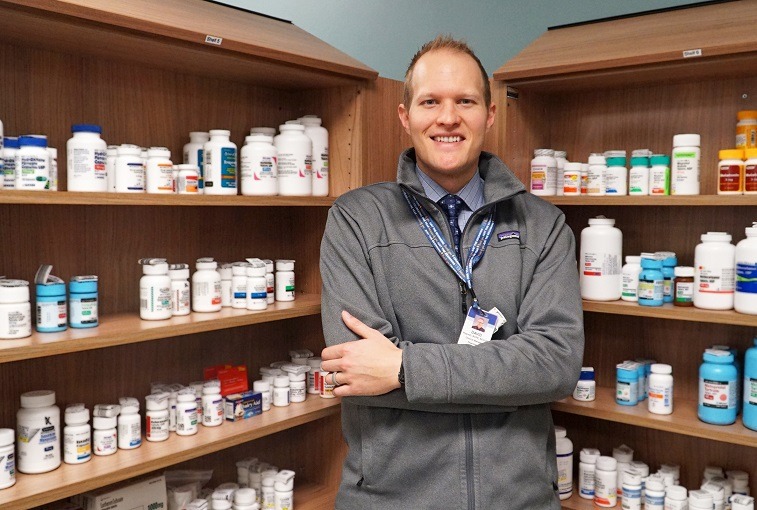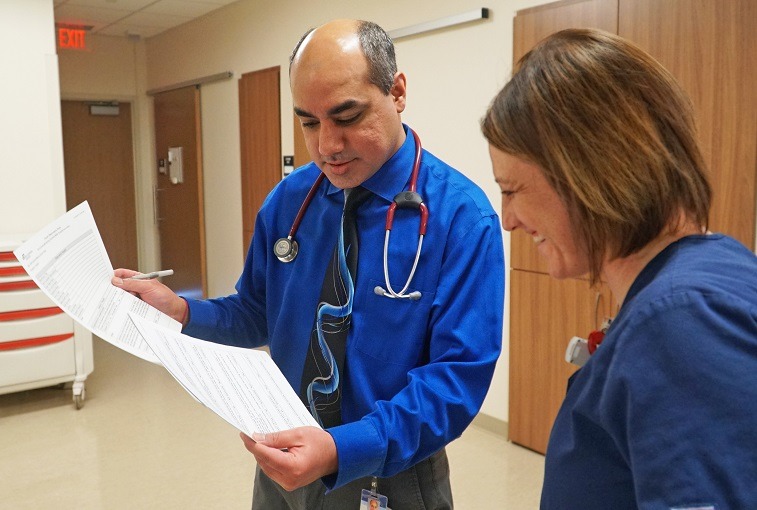Clostridioides difficile, also known as C. diff, is considered one of the worst health care acquired conditions or infections. It can cause many complications and morbidity. However, it’s often preventable. Many studies have looked at prevention and treatment methods, but with so much literature out there, it can be difficult for medical providers to know what’s best.
Sanford Pharmacy manager David Leedahl and Sanford Health infectious disease specialist Avish Nagpal, M.D., joined with two Mayo Clinic medical experts to evaluate the current literature to determine what the best practices really are. Their findings have been published in Pharmacotherapy.
What is C. diff?
According to the Centers for Disease Control and Prevention, C. diff is a “bacteria that causes life-threatening diarrhea.” Those most affected are people over age 65 who take antibiotics and receive medical care, those who spend a long period in a hospital or nursing home or those with weakened immune systems or previous C. diff infections.
Leedahl explained that C. diff is such a concern in a hospital setting because of the patient population and the bacteria’s ability to spread.
“We give antibiotics to treat infection, but concurrently, we can mess up the type of bacteria in the digestive tract, and C. diff that may already be present has the opportunity to grow rapidly and basically cause disease,” Leedahl said. “Also, C. diff spores are very difficult to disinfect against. They can transfer between the patient and the environment. Even if one patient in your health care environment has C. diff, it becomes a risk to other patients, so it’s incredibly important to not only contain it and treat it, but prevent it from the get go.”
Treatment versus prevention
Much of the literature for C. diff looks at treatment of the infection instead of focusing on prevention.
“By the time you’re treating disease, it’s too late,” Leedahl said. “It’s important to look at prevention as C. diff is preventable and it’s enormously burdensome to patients from a morbidity standpoint. Patients do die from C. diff.”
Evaluating studies for best guidelines
With many studies and recommendations available to medical providers, the best option for C. diff prevention was unclear.
“We are in the information age. There is a lot of data -– some of that you understand, some you don’t. Some of the data reflects what’s important but there’s a lot of data that’s just background noise and isn’t important,” Nagpal said. “Clinicians are busy just like everyone else. There are millions of articles published every year, and even if you read them all, you may not understand the nuances of those articles.”
Which brought about an opportunity from Pharmacotherapy. The publication serves as a center point for hospital-related items related to medication. It put out a call for prevention strategies for critically ill patients.
Leedahl, Nagpal and the Mayo Clinic team decided to focus on preventing C. diff in the intensive care unit setting.
“There is so much data and so many articles that have information about things you can try to do -– hygiene, how you clean the room, how you use protective equipment in the room, certain medications you can use or avoid, with the belief that some medications increase C. diff risk more than others,” Leedahl said.
“What we rely on for our education is for someone to identify the gaps in knowledge to improve patient care. The goal is to increase or summarize the available data and make decision making easier and simpler to understand,” Nagpal said.
The goal of the evaluation was to help steer health care organizations into success strategies.
“We had no firm guidance on strategies that actually worked coming into this project,” Leedahl said.
Determining the best prevention methods
After an evaluation of the literature, the team summarized the top, evidence-based initiatives that can prevent C. diff in the ICU.
1. Robust hygiene strategies
This includes hand hygiene programs and intentional and systematic decontamination of the patient rooms.
2. Diagnostic and antimicrobial stewardship
Diagnostic stewardship means that testing for C. diff should be limited to patients who have a very high likelihood of the disease and the diarrhea isn’t due to something else, according to Leedahl.
Antimicrobial stewardship focuses on the minimum amount and duration of antibiotics as possible for infections.
“It’s important to know that antibiotics are not the solution for every problem that you have,” Nagpal said. “Widespread use or misuse of antibiotics can do more harm than good for you.”
“More is not more. Most of the time, less is more with antibiotics,” Leedahl said.
3. Particular prophylaxis maneuvers
“Prophylaxis maneuvers mean if patients have had C. diff in the past, we would treat them without trying to diagnosis them. We would treat them as soon as they were put into a high-risk situation,” Leedahl said. “We would be preventing by treating. Rather than watching and waiting, we would just treat as a prophylaxis maneuver.”
Evaluating work across disciplines
The health care environment is more than doctors and nurses. Pharmacists, specialists, environmental services, administration, volunteers and others all play a role in patient care.
“C. diff is a good example of collaborating across specialties because it involves a lot of disciples. It highlights the complexity of the health care needs of patients and how we provide health care in this day and age,” Nagpal said.
“We’re only as strong as our weakest link when it comes to C. diff prevention,” Leedahl said. “We all have to be strong in the efforts that are in our control.”
Because of that, Leedahl said prevention should be top of every person’s mind when they’re interacting with patients.
“Every intern and therapist and support staff person is involved because hand hygiene is such an important aspect of prevention. Spores can be easily transferred between people and environment,” Leedahl said.
For the health of the patients
The literature was evaluated to provide guidance for medical providers, but the patients are really those who will benefit.
“We’re committed to the effort to keep them safe and not do any harm by the treatments that we give,” Leedahl said. “I think patients can be encouraged that we are really trying to prioritize the things that work, and while there are a lot of things that have been talked about out there, we want to ensure that the things that work are the things that we’re doing.”
…
Posted In Digestive Health, Health Information, News, Senior Services

